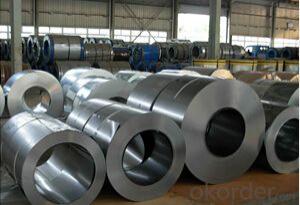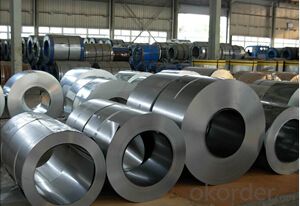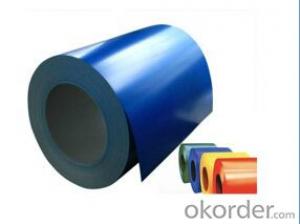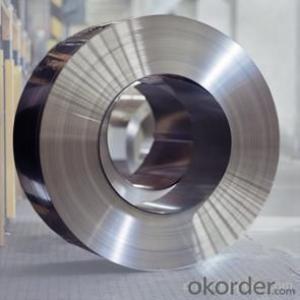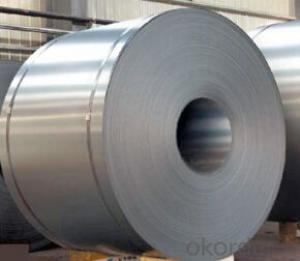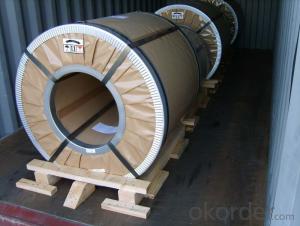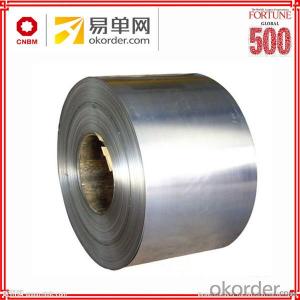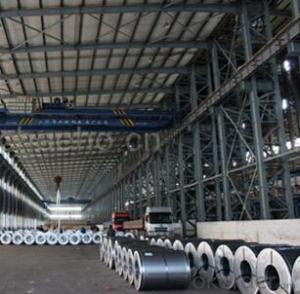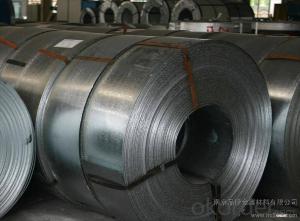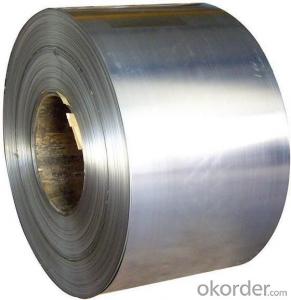Full Hard Spcc Cold Rolled Steel Coil for Construction
- Loading Port:
- Shanghai
- Payment Terms:
- TT OR LC
- Min Order Qty:
- 25 m.t.
- Supply Capability:
- 50000 m.t./month
OKorder Service Pledge
OKorder Financial Service
You Might Also Like
cold rolled steel coil description :
Standard:AISI,ASTM,BS,DIN,GB,JIS
Grade:SPCC,JIS G3141-SPCC
Thickness:0.13-2.5mm
Type:Steel Coil
Technique:Cold Rolled
Surface Treatment:Dull finish / Bright finish
Application:Automobile Manufacture
Special Use:High-strength Steel Plate
Width:600-1500mm
Length:200-10000m
Surface:Dull finish / Bright finish
Oil:Slight Oiled
full hard spcc cold rolled steel coil
1. width: 600-1500mm
2. thickness: 0.13-2.5mm
3. grade: JIS G3141-SPCC-1B, SPCC-1D
4. coil weight: 3-14 ton
5. coil ID: 508 / 610 mm
6. surface: dull finish / bright finish
7. oil: sligh oiled
8. packing; export standard packing
9. capacity: 1,000,000 ton / year
10. MOQ: 60 ton per size
11. loading port: Tianjin Port / Jingtang Port / Shanghai Port
Chemical Composition---JIS G3141 | |||||
Symbol of grade | C | Mn | P | S | |
SPCC | 0.15 max | 0.60 max | 0.100 max | 0.050 max | |
SPCD | 0.12 max | 0.50 max | 0.040 max | 0.040 max | |
SPCE | 0.10 max | 0.45 max | 0.030 max | 0.030 max | |
SPCF | 0.08 max | 0.45 max | 0.030 max | 0.030 max | |
SPCG (1) | 0.02 max | 0.25 max | 0.020 max | 0.020 max | |
Note (1): The upper limit value may be differ upon agreement between the purchaser and the supplier. | |||||
Remarks: Alloying elements other than those in this table can be added as necessary. | |||||
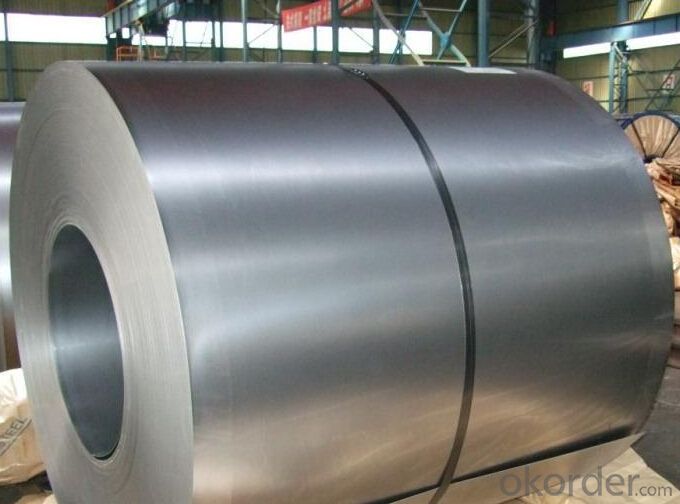
- Q: What are the challenges in coil recoiling?
- Coil recoiling, which is also known as coil winding, brings about a range of challenges that depend on the specific application and requirements. Some of the common hurdles encountered in coil recoiling are as follows: 1. Precision and accuracy: Achieving precise and accurate winding is vital for optimal coil performance. It is crucial to maintain consistent tension throughout the winding process, ensure proper alignment, and control the speed in order to prevent variations in the electrical properties of the coil. 2. Wire management: Managing the wire during the recoiling process can be difficult. The wire may be fragile, prone to tangling, or have specific handling requirements, such as being sensitive to magnetic or thermal influences. Employing proper wire management techniques, such as tension control, wire guide systems, and spooling mechanisms, is necessary to prevent wire damage and ensure uniform winding. 3. Space limitations: In many cases, coils need to fit within specific space constraints. Designing and winding coils to fit compact spaces can be challenging, particularly when considering the required number of turns, wire size, insulation, and any additional components or structures that may need to be incorporated. 4. Material selection: The selection of the appropriate wire and insulation material is crucial for optimal coil performance and durability. Factors such as electrical conductivity, thermal properties, mechanical strength, and chemical resistance must be taken into account to ensure that the coil can withstand the operating conditions and environmental factors it will encounter. 5. Heat dissipation: Coils often generate heat during operation, especially in high-power applications. Efficient heat dissipation is crucial to prevent overheating and ensure the longevity of the coil. Techniques such as designing the coil with proper ventilation, utilizing cooling mechanisms, or incorporating heat sinks are employed to address this challenge. 6. Quality control: Ensuring consistent quality in coil recoiling can be challenging due to factors such as variations in wire properties, operator skill, equipment calibration, and environmental conditions. Robust quality control measures, such as conducting regular inspections, performing electrical tests, and monitoring process parameters, need to be implemented to maintain consistent coil performance. In summary, coil recoiling demands meticulous attention, precision, and adherence to specific requirements in order to overcome the challenges and produce high-quality coils that meet the desired performance criteria.
- Q: How are steel coils used in the production of agricultural irrigation systems?
- Steel coils are used in the production of agricultural irrigation systems as they are often used to manufacture pipes, tubing, and other structural components that are necessary for the efficient distribution of water to crops. The strength and durability of steel coils make them ideal for withstanding the high pressure and harsh conditions often encountered in irrigation systems, ensuring a reliable and long-lasting solution for farmers.
- Q: What are the common methods of slitting steel coils?
- There exists a variety of methods for slitting steel coils, each possessing their own distinct advantages and applications. 1. Rotary Shear Slitting: This technique utilizes rotary cutting knives to separate the steel coil. The coil is passed through the rotary shear machine, and the knives make simultaneous cuts along the coil's length. Rotary shear slitting is renowned for its high-speed operation and ability to handle thicker gauge materials. 2. Loop Slitting: Loop slitting involves introducing the steel coil into a looping pit, creating a loop of material. The loop is then pulled through a set of knives that make the cuts. This particular approach is commonly employed for thin gauge materials, providing precise cuts with minimal burr. 3. Drag Slitting: In drag slitting, the steel coil is fed through a series of driven rolls or drag pads, which maintain tension on the material. The coil is then guided through circular knives that perform the slits. Drag slitting is suitable for various steel gauges and offers good accuracy and edge quality. 4. Crush Slitting: Crush slitting entails passing the steel coil through a set of rolls, with one roll being rubber-covered and the other being hard. The rubber roll compresses the material against the hard roll, resulting in the slits. This method is commonly utilized for thin gauge or delicate materials, as it minimizes the risk of edge damage. 5. Laser Slitting: Laser slitting employs a high-powered laser beam to make precise cuts on the steel coil. This method is highly accurate and enables complex slitting patterns and narrow width cuts. Laser slitting is frequently utilized for high-end applications that demand superior edge quality. Each of these methods possesses unique advantages and is selected based on factors such as material thickness, desired edge quality, production speed, and cost considerations. It is crucial to meticulously select the appropriate slitting method to ensure the desired outcome and efficiency in steel coil processing.
- Q: How are steel coils used in the production of steel tanks?
- Steel coils are an essential component in the production of steel tanks. These coils, which are typically made from high-quality steel, serve as the primary raw material for manufacturing steel tanks. The first step in the process is to unroll and flatten the steel coils, which are usually delivered in a coiled form from the steel mills. Once the coils are unrolled, they are then cut into specific lengths and widths, depending on the desired dimensions of the steel tank. These cut pieces are then molded and shaped into the different components of the tank, such as the cylindrical body, the top and bottom ends, and any additional fittings or accessories. The steel coils provide the necessary strength and durability to the tank, ensuring that it can withstand the rigors of its intended application. The quality of the steel used in the coils is crucial, as it determines the tank's resistance to corrosion, pressure, and external forces. Moreover, the use of steel coils allows for efficient and cost-effective production of steel tanks. The standardized nature of the coils ensures consistent quality and dimensions, resulting in a streamlined manufacturing process. The ability to cut the coils into precise lengths and widths also minimizes wastage and maximizes material utilization. Furthermore, steel coils offer flexibility in terms of design and customization. They can be easily formed and welded into complex shapes, allowing for the creation of tanks with varying sizes, capacities, and configurations. This versatility makes steel coils an ideal choice for producing tanks for diverse sectors, including industrial, commercial, and residential applications. In summary, steel coils play a crucial role in the production of steel tanks. They provide the necessary raw material for manufacturing various tank components, ensuring strength, durability, and customization. By utilizing steel coils, manufacturers can efficiently produce high-quality tanks that meet the specific requirements of different industries.
- Q: What are the common applications of pre-painted galvanized steel coils?
- Pre-painted galvanized steel coils have a wide range of applications across various industries. Some of the common applications include: 1. Construction: Pre-painted galvanized steel coils are extensively used in the construction industry for roofing, wall cladding, and structural components. The coating on these coils provides excellent corrosion resistance and durability, making them suitable for both residential and commercial buildings. 2. Automotive: These coils are also widely used in the automotive industry for manufacturing parts and components such as body panels, interior trims, and underbody protection. The pre-painted coating enhances the aesthetic appeal of the vehicles while providing protection against rust and corrosion. 3. Appliances: Pre-painted galvanized steel coils are commonly used in the production of home appliances such as refrigerators, ovens, washing machines, and air conditioners. The smooth and durable coating on these coils ensures a long-lasting and visually appealing finish for the appliances. 4. Furniture: The pre-painted galvanized steel coils find application in the furniture industry for manufacturing cabinets, shelves, and other furniture components. The coating on these coils adds a decorative touch to the furniture while offering protection against scratches and wear. 5. Electrical and Electronics: These coils are utilized in the electrical and electronics industry for manufacturing switchboards, control panels, and enclosures. The pre-painted coating provides insulation and protection against electrical hazards, making them suitable for such applications. 6. Agricultural Equipment: Pre-painted galvanized steel coils are also used in the agricultural sector for manufacturing equipment like grain silos, livestock shelters, and poultry houses. The corrosion-resistant coating on these coils ensures the durability and longevity of the agricultural structures. 7. Signage and Advertisement: The vibrant and visually appealing colors of pre-painted galvanized steel coils make them a popular choice for signage and advertisement boards. The coated surface provides a smooth and glossy finish that enhances the visibility and attractiveness of the signage. In summary, the common applications of pre-painted galvanized steel coils include construction, automotive, appliances, furniture, electrical and electronics, agricultural equipment, and signage and advertisement. These coils offer excellent corrosion resistance, durability, and aesthetic appeal, making them suitable for a wide range of industries and applications.
- Q: What is the major disadvantage of hardened steel? Do you think this form of iron would be wear resistant and retain a sharpened edge?
- a disadvantage is the fact that the cold forming capability of this steel
- Q: I am buying a knife for my future husband for his wedding gift and I was wondering what is better carbon steel or stainless steel?
- It depends on what your husband plans to do with the knife. In general, stainless steel knives are more resistant to rust and corrosion but carbon steel knives hold a sharp edge for longer. Those are only general statements, because high carbon knives can be coated to resist rust, and some high quality stainless steel knives can hold a great edge. There are many different metal alloys used for knives, and each one has its own properties. If I were you, I would buy a high carbon steel knife, unless you think your husband would use the knife under conditions that might make it rust (fishing or boating, for example).
- Q: How are steel coils used in the manufacturing of roofing materials?
- Steel coils are used in the manufacturing of roofing materials as they are rolled into sheets or formed into various shapes to create durable and long-lasting roofing products. The coils are processed through machines that cut, bend, and shape them into the desired dimensions and profiles required for different types of roofs.
- Q: I have a 03 jeep wrangler and looking to upgrade to black wheels. I was wondering if the difference between steel and alloy wheels is worth paying double.
- steel is steel is steel- they will always be heavy you would have to weigh them to find out--NOW if you are going to alloy wheels they are typically aluminum and yes they are lighter -this is good because it lightens your un-sprung weight and is less harmful to your suspension-good for your auto
- Q: How are steel coils cut to size?
- Steel coils are cut to size using a process called slitting, where the coil is fed through a series of rotating circular blades that make multiple cuts along its length. The blades are spaced at specific distances to achieve the desired width, and the cut strips are then rewound into separate coils.
Send your message to us
Full Hard Spcc Cold Rolled Steel Coil for Construction
- Loading Port:
- Shanghai
- Payment Terms:
- TT OR LC
- Min Order Qty:
- 25 m.t.
- Supply Capability:
- 50000 m.t./month
OKorder Service Pledge
OKorder Financial Service
Similar products
Hot products
Hot Searches
Related keywords
